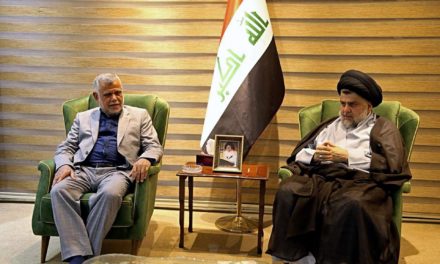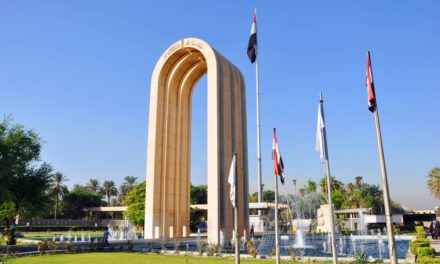(Photo: Ahmad Al Rubaye/AFP)
Parties require large financial and human resources to participate in Iraqi elections. From registration, to having a physical presence of a headquarters, to funding election campaigns, it is no small feat.
The Iraqi Parties Law set several conditions for party formation, most of which require the candidate or party having a large sum of money. For instance, the Independent High Electoral Commission (IHEC) stipulates that the independent candidate pays the equivalent of approximately $8,400 as a deposit, while a political party is expected to pay the equivalent of approximately $42,000.
Election campaign experts estimate that for individuals running in Baghdad, hundreds of thousands of dollars are required to organize a competitive electoral campaign. As for parties that intend to run nationwide campaigns, they require anywhere from five to ten million dollars. Experts estimate that the cost of advertising to win a single seat in parliament requires $200,000-250,000 as a minimum, while costs in larger governorates like Baghdad, Nineveh and Basra, may double due to larger competition.
To incorporate all the requirements outlined above, the Iraqi Parties Law No. 36 of 2015 allowed four funding outlets, which are: the contributions of its members, donations/internal grants, returns on legal investments, and financial subsidies from the public budget in accordance with the criteria set forth in this law. Furthermore, the Iraqi Parties Law stipulates that the sources of funding should be announced transparently for each registered party. Despite this, the sources of funding provided to parties according to the law will not guarantee them a position in the Iraq political scene without foreign aid and other undisclosed funding. That being said, while the law specifies the maximum amount of money allowed for each candidate or party to spend on an election campaign is one million dollars for an individual and $144 million for each party. In Baghdad, the law does not specify the upper limit for donations or contributions, which allowed political parties to amass large funds, oftentimes from unofficial sources. For example, there are suspicions hovering around senior political figures who receive funding beyond Iraq’s borders.
The lack of specificity in the party law with regards to funding leads to disproportionate party budgets. The sources of funding by the major political parties are numerous, and many observers believe that a lot of the funding, especially for incumbent parties actually comes from the state’s coffers. In addition to large budgets, major political parties own multiple headquarters, oftentimes in the same governorate.
Certain businessmen and media moguls participate in financing political parties with the aim of winning political capital, official positions or simply for publicity. However, many candidates do not disclose these sources. During the period of electoral campaigning and the stage of examining candidate documents, political parties turned to a number of illegal campaigning tactics. This included tapping into bank accounts and companies for political money laundering, where each political party collects the largest number of donors – including businessmen, contractors and foreign government agents who conducted discreet meetings within and outside Iraq.
Past experience from federal and governorate elections has demonstrated that donors influence the financial committees of parties. This influence can extend to party leaders, choice of alliances, choice of candidates, electoral list arrangements and decisions concerning distribution of legislative and executive appointments.
In addition to the lack of specificity in the Iraqi Party Law, the measures taken by IHEC towards parties that are dishonest or elusive regarding their sources of funding are ineffective, since there is a lack of transparency and ease of manipulating financial reporting in Iraq. Many of these parties intentionally try to blur the line between electoral advertising funds and party funds. Most parties prefer to conceal their true sources of funding, despite claims to commitment to transparency. Those parties that announce their funding sources proclaim something similar to“the party’s budget, movement, list, or assembly comes mainly from endowments and donations from members”. The majority, however, do not even send their financial reports to the Office of Financial Supervision, integrity departments, or tax accounting departments.
The lack of accountability encourages political parties to continue their financial practices as there seems to be public focus on the personal background of candidates and their political leaders.
In October 2019, nationwide demonstrations broke out where more than 500 demonstrators gave their lives and thousands were wounded. Some demonstrators called for a united political front and the creation of new parties that can further their demands. This approach to reform is important as it aims to preserve the democratic system in Iraq and avoids starting from scratch, as occurred in 2003, which was followed by chaos and loss of security. However, young leaders and their supporters may serve as electoral alliances in the coming elections, as they are certainly unable to keep up with the major political parties that have external support and ministerial posts in previous governments that give them access to public resources.
The electoral competition between the old and new political parties will play out unevenly in the media. For one, small parties with legitimate funding are financially constrained from advertising in all governorates. Furthermore, most of their members are likely to be either unemployed, university students or simple employees with restricted resources. If genuine political reform is to be accomplished, changes need to occur in the Iraqi Parties Law particularly with regards to stricter financing and transparency rules.

Lina Musawi
Lina Musawi is a political researcher and journalist. She is completing a Master’s degree in conflict resolution and peace building at University of Baghdad.










